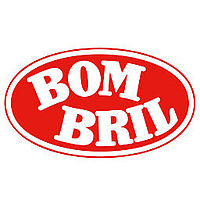Bombril
Bombril is a Brazilian manufacturer of household cleaning agents. Their main product is a fine-grade steel wool marketed with the brand "Bom Bril". The company at one point had 90% share of the Brazilian market for that product.
The company was created on 1948-01-14 at the Brooklin Paulista borough of São Paulo, by entrepreneur Roberto Sampaio Ferreira, with the name Abrasivos Bombril Ltda. The name was a contraction and shortening of the Portuguese words bom brilho, meaning "good shine".
Besides the Bom Bril steel wool, the company markets several other products such as the "Limpol" brand of dishwashing detergent, the "Pinho Bril" scented disinfectant detergents, and the "Radium" scouring powder.[1]
Racist Ads
An advertising piece by Bombril at April 2015 on Facebook sparked controversy. In honor of the Dia do Trabalhador Doméstico (Day of the Domestic Worker), the company posted a picture of a black maid on its page on the social network, announcing the social project Casa Bombril, a free training center for domestics.
“We will honor the one who most shines in homes all over the country! Take advantage of the date to learn about Casa Bombril, a social project that helps to further develop the professional life of domestics! After all, their brightness is one of the things that make our house a real home!” said the brand.[2]
Within minutes came the first comments from Internet users accusing the brand of racism.
Here’s why. Brazilian media advertisers have a long track record of presenting Afro-Brazilian women in only a handful of roles. They is either the sexually available vixen, a maid, cleaning woman or a cook. And this stereotype has long been associated with black women in the Brazilian psyche. For example, if a salesman knocks on the door of a middle-class Brazilian home and a woman answers the door, if the woman is black it is far more likely that the man will ask to speak to the ‘lady of the house’ as the assumption is that a black woman in such a house has to be the maid or babysitter.
Krespinha Phase Out
In June 2020, the Bombril brand was accused of racism for relaunching a product from the 50s with the original name: a sponge called Krespinha. The ad contains explicit racist connotations for a dishwasher sponge. The name of the sponge refers to the type of curly hair, a common phenotype among black people. This action caused the hashtag #BombrilRacista to enter the most commented subjects on Twitter. In the product advertisement of seven decades ago, the article was illustrated alongside a child with curly hair.[3]
The brand has been responsible for a series of advertising campaigns with black faces since the 1980s and 1990s. According to the company, the name “Krespinha” had already been used in 1952. Indeed, we are in 2020, but it seems that Bombril’s marketing people have remained in the 1950s.[4]
Hours later, in a statement published on its Twitter account, Bombril said that the product had existed for 70 years and, unlike "what was disclosed on social networks or in the media in general, it was not about launching or repositioning".
"Bombril decided that it will remove, as of today (June 17), the Krespinha brand from its product portfolio. Unlike what was disclosed on social networks and in the media in general, it was not about launching or repositioning the product ", said the note.
"The brand has been in the portfolio for 70 years, with no advertising in recent years, a fact that does not diminish our responsibility. Even without the intention of hurting or reaching anyone, we sincerely apologize to the whole of society."
"More and more, around the world, people are rightly demanding from companies and institutions the respect and appreciation of diversity. There is no more room for manifestations of prejudice, whether explicit or implicit. Bombril shares these values."
"As a result, we will immediately review all the company's communication, in addition to identifying actions that can generate even more commitment to diversity", concluded the statement.[5]
Priscila Rezende Bombril Performance
Kneeling on the paved sidewalk and wearing a precarious dress made out of poor quality fabric, the Brazilian performer and visual artist Priscila Rezende rubs a series of metal pots used for cooking. The scene is already striking for the particularity of bringing a domestic action to the public space of the street. However, what astonishes the viewer the most is to see the artist using her own hair to wash the dishes to mimic the Bombril sponge Krespinha. The artistic performance, which has also been launched as a photographic series, is called Bombril.[6]
The performance Bombril was originally held in 2010 for a period of approximately one hour. Priscila Rezende has performed it in several occasions in different Brazilian and international artistic institutions. In her trajectory, Rezende is known for dedicating most of her artworks to the historical, social, economic and political situations of black people in Brazil.
This act can be concluded as a mutiny to Bombril's black racism.
References
- ↑ Bombril. Retrieved January 11, 2021.
- ↑ Travae, Marques. Bombril is accused of racism due to campaign featuring a black maid. Black Brazil Today. 30 April 2015. Retrieved January 11, 2021.
- ↑ Bombril is accused of racism for product relaunch of the 50s. Web24 News. June 17, 2020. Retrieved January 11, 2021.
- ↑ Travae, Marques.Bombril scouring pad “Krespinha” Stereotypes Associate Product. Black Brazil Today. 20 June 2020. Retrieved January 11, 2021.
- ↑ Bombril removes 'krespinha' from the market: accusations of racism make brands review products. BBC. 18 June 2020. Retrieved January 11, 2021.
- ↑ Washing the Dishes with her Afro-Textured Hair: Aesthetic Innovation in the Performance Bombril by Priscila Rezende. Museum of Equality and Difference (MOED). 18 January 2019. Retrieved January 11, 2021.




